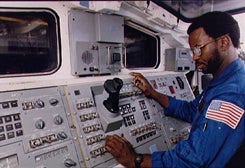The Ronald E. McNair Post-Baccalaureate Achievement Program was established in 1986, as one of the TRIO educational opportunity grant programs funded by the U.S. Department of Education.

The program’s namesake, Dr. Ronald E. McNair, was an accomplished African American laser physicist and NASA Astronaut who perished in the Challenger Space Shuttle accident in 1986.
Dr. McNair came from a poor family in an impoverished South Carolina community. In his lifetime he endured racism, classism, low expectations, very limited opportunities, and few resources. Despite the fact that no one in his family and few in his community had attended college, Dr. McNair toiled to attain his dream of becoming a distinguished scientist.
In 1971 he graduated Magna Cum Laude from North Carolina A&T State University with a B.S. in physics. In 1976, at the age of 26, he earned his Ph.D. in laser physics from the Massachusetts Institute of Technology. By age 27, he was a recognized expert in his field and selected by NASA in 1978 (at age 28). He served as a mission specialist aboard the 1984 and 1986 flights of the Challenger.
Among his many academic achievements, Dr. McNair was the recipient of three honorary doctorates and a number of fellowships and commendations. He was a sixth degree black belt in karate and an accomplished jazz saxophonist. Dr. McNair was an ardent champion of higher educational opportunities for students.
This US Dept. of Education TRIO educational opportunity program honors his memory and promotes his vision.
The Boise State McNair Scholars Program is funded by a $267,841 grant from the U.S. Department of Education and is an institutional member of the Council for Opportunity in Education and the Northwest Association of Educational Opportunity Programs.